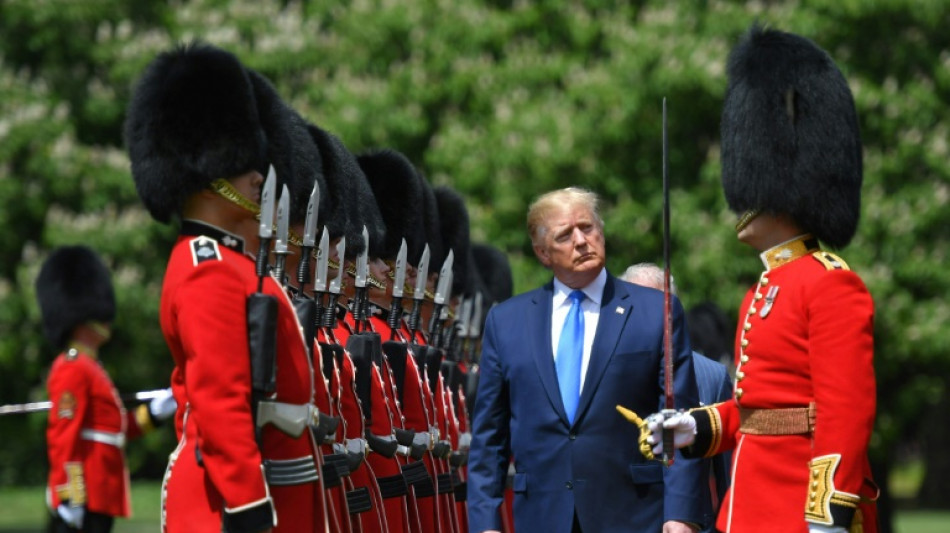
-
 Sainz opts out of race for FIA presidency
Sainz opts out of race for FIA presidency
-
Shamar Joseph rips through Australia top order in first Test

-
 Court rejects EDF complaint over Czech nuclear tender
Court rejects EDF complaint over Czech nuclear tender
-
Mbappe returns to Real Madrid training at Club World Cup

-
 Kenya anniversary protests turn violent, 8 dead
Kenya anniversary protests turn violent, 8 dead
-
Elliott double fires England into Under-21 Euros final

-
 Trans campaigners descend on UK parliament to protest 'bathroom ban'
Trans campaigners descend on UK parliament to protest 'bathroom ban'
-
New York mayoral vote floors Democratic establishment
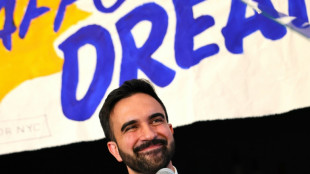
-
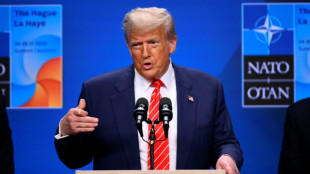 Trump claims 'win' as NATO agrees massive spending hike
Trump claims 'win' as NATO agrees massive spending hike
-
EU probes Mars takeover of Pringles maker Kellanova

-
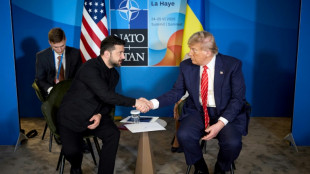 Sidelined Zelensky still gets Trump face time at NATO summit
Sidelined Zelensky still gets Trump face time at NATO summit
-
Mexico president threatens to sue over SpaceX rocket debris

-
 Amazon tycoon Bezos arrives in Venice for lavish wedding
Amazon tycoon Bezos arrives in Venice for lavish wedding
-
Shamar Joseph gives West Indies strong start against Australia

-
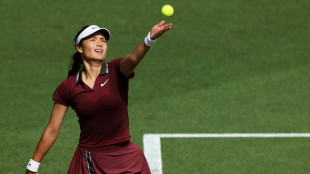 Raducanu's Wimbledon build-up hit by Eastbourne exit
Raducanu's Wimbledon build-up hit by Eastbourne exit
-
RFK Jr.'s vaccine panel opens amid backlash over fabricated study
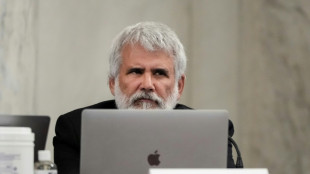
-
 'You try not to bump into things:' blind sailing in Rio
'You try not to bump into things:' blind sailing in Rio
-
Trump says 'three or four' candidates in mind for Fed chief
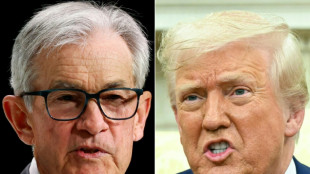
-
 Trump teases Iran talks next week, says nuclear programme set back 'decades'
Trump teases Iran talks next week, says nuclear programme set back 'decades'
-
Turkey tussles with Australia to host 2026 UN climate talks
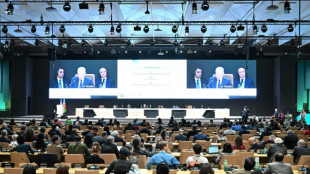
-
 Bielle-Biarrey 'fit' for Top 14 final after suffering concussion
Bielle-Biarrey 'fit' for Top 14 final after suffering concussion
-
James Webb telescope discovers its first exoplanet

-
 Kenya's Kipyegon seeks history with four minute mile attempt
Kenya's Kipyegon seeks history with four minute mile attempt
-
Gunmen kill 10 in crime-hit Mexican city

-
 Olympic surfing venue battling erosion threat
Olympic surfing venue battling erosion threat
-
Relief, joy as Israel reopens after Iran war ceasefire

-
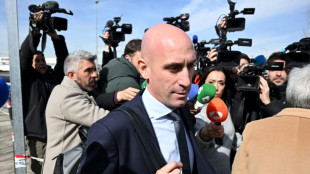 Spain upholds fine against Rubiales for Hermoso forced kiss
Spain upholds fine against Rubiales for Hermoso forced kiss
-
Iran hangs three more accused of spying as fears grow for Swede

-
 Australia choose to bat first in first Test against West Indies
Australia choose to bat first in first Test against West Indies
-
Gambhir backs India bowlers to 'deliver' despite first Test misery

-
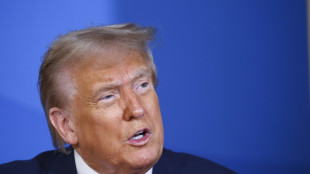 Trump reassures allies as NATO agrees 'historic' spending hike
Trump reassures allies as NATO agrees 'historic' spending hike
-
England's Duckett says mindset change behind Test success

-
 Trump sees 'progress' on Gaza, raising hopes for ceasefire
Trump sees 'progress' on Gaza, raising hopes for ceasefire
-
UK's Glastonbury Festival opens gates amid Kneecap controversy

-
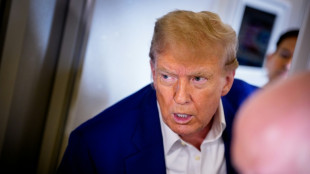 Oil rebounds as markets track Iran-Israel ceasefire
Oil rebounds as markets track Iran-Israel ceasefire
-
Cable theft in north France disrupts Eurostar traffic
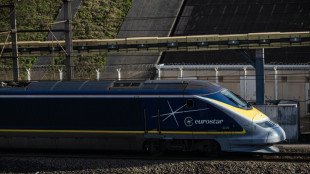
-
 Cambodians at quiet Thai border plead for peace
Cambodians at quiet Thai border plead for peace
-
Trump plays nice as NATO eyes 'historic' spending hike
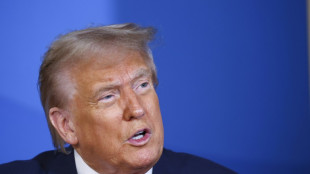
-
 Barcelona announce Camp Nou return for August 10
Barcelona announce Camp Nou return for August 10
-
Trump insists Iran nuclear programme set back 'decades'

-
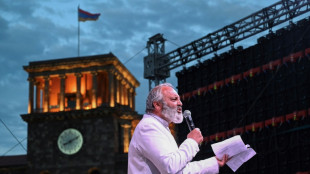 Armenia PM says foiled 'sinister' coup plot by senior cleric
Armenia PM says foiled 'sinister' coup plot by senior cleric
-
Turkey breathes easier as Iran-Israel truce eases fallout risk
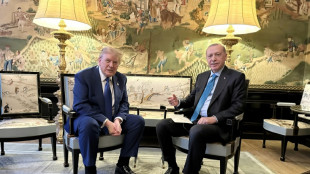
-
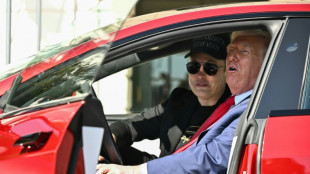 Tesla sales skid in Europe in May despite EV rebound
Tesla sales skid in Europe in May despite EV rebound
-
'Not Test class': Pundits tear into India after England chase 371

-
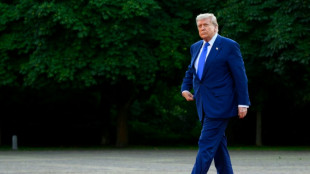 Trump whirlwind tests NATO summit unity
Trump whirlwind tests NATO summit unity
-
Justice orders release of migrants deported to Costa Rica by Trump

-
 Vietnam tycoon will not face death penalty over $27 bn fraud: lawyer
Vietnam tycoon will not face death penalty over $27 bn fraud: lawyer
-
Vietnam abolishes death penalty for spying, anti-state activities
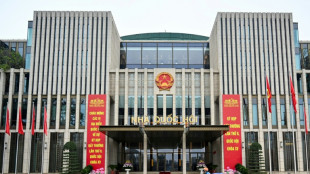
-
 Over 80,000 people flee severe flooding in southwest China
Over 80,000 people flee severe flooding in southwest China
-
AI fakes duel over Sara Duterte impeachment in Philippines


Flattery and pragmatism: UK plan to stay on Trump's good side
With its flattering rhetoric, leniency in responding to US trade threats and alignment with Washington this week at a summit on artificial intelligence, the United Kingdom has signalled a willingness to take President Donald Trump's side over Europe.
"The UK has no closer ally than America," Britain's newly appointed ambassador to the United States, Peter Mandelson, said on Tuesday, in a video overflowing with superlatives posted on Elon Musk's X platform.
The Labour party grandee, formerly a European commissioner, had told the BBC on Monday that Britain has "to respect and understand what drives (Trump), what his mandate is to do, and how his allies need to adjust sometimes".
David Lammy, Britain's top diplomat, also lavished praise on Trump last month, saying he displayed "incredible grace and generosity" and was "very funny, very friendly, very warm" during their meeting last September.
The comments were somewhat more complimentary than previous remarks by Lammy in which he called Trump a "woman-hating, neo-Nazi-sympathising sociopath".
The conciliatory tone is "likely to be calculated at keeping the UK out of Trump's crosshairs when it comes to tariffs and any other forms of aggressive US foreign policy," said Michael Plouffe, an associate professor at UCL university in London.
Jonathan Portes, an economist at King's College London, said "the UK, as usual, is trying to have its cake and eat it".
"This is perfectly rational and sensible," he added. "It is hoping to avoid the worst excesses of Trump at the same time as it pursues its rapprochement with the EU."
- 'Makes sense' -
The European Union remains by far Britain's largest trading partner, but London has dreamt of a trade agreement with Washington, which Prime Minister Keir Starmer recently called for, since leaving the bloc.
Faced with the frenetic start to Trump's presidency and his unpredictable diplomatic manoeuvrings, Starmer has in recent days made strategic choices to distance himself from the Europeans.
There is no question of Britain joining the EU's countermeasures promised on Tuesday in response to Trump's newly announced 25-percent customs duties on steel and aluminium, which the United States will impose from March 12.
Britain instead says that it is "engaging" with the United States on the details of the tariffs.
"What British industry needs and deserves is not a knee-jerk reaction but a cool and clear-headed sense of the UK's national interest based on a full assessment of all the implications of the US's actions," said British trade minister Douglas Alexander.
London also sided against the EU on the crucial issue of artificial intelligence, teaming up with the United States in refusing to sign the final declaration of the AI summit in Paris on Tuesday.
"We felt the declaration didn't provide enough practical clarity on global governance, nor sufficiently address harder questions around national security and the challenge AI poses to it," said a British government spokesperson.
This "cautious approach to the US" over AI is aligned with Starmer's promise to make the Britain a world leader in the sector, said Plouffe.
It also "makes sense" that Starmer would avoid "antagonism with the state that is home to three of the leading AI providers", he added.
"This may win some favour with Trump" at a time when the digital giants, who have become the Republican's close allies, are locked in regulatory disputes with the EU.
"I think he's done a very good job thus far," Trump said of Starmer in late January. "I like him a lot."
But can the British strategy work in the long term?
"That depends on just how confrontational Trump is with the EU and whether he wants to try to lever the UK away from the EU," Portes said.
"Since nobody -- including him -- knows what he's going to do, I certainly don't," he added.
L.AbuAli--SF-PST
